Healthy Parenting Insights:
Reduce Potential Child Health Problems via Your Lifestyle
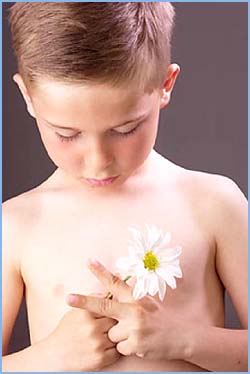
- Enrich your healthy parenting knowledge with important insights into the physiological aspects raising healthy children.
- Get practical parenting advice solidly rooted in
research results about healthy lifestyle, healthy nutrition and precautions to make against environmental pollutants and biological contaminants.
- But before we immerse ourselves into the essence of healthy nutrition and ensuring healthy home environments etc., I will explain to you
why the state of your child's physical body is so extremely important.
Diving into the Bottom Parts of Maslow's Pyramid of Needs!
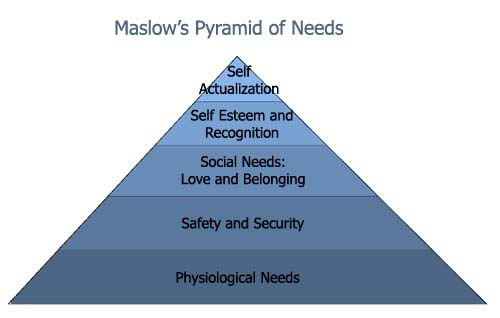
If you are familiar with the principles of Maslow's pyramid of needs, it will make sense to you, when I say that I will be dealing with parenting issues belonging to the fat, bottom parts of the needs pyramid: Ensuring your child's physical wellbeing short term and long term.
The idea behind Maslow's pyramid is that you have to have the needs of the lower stages of the pyramid fulfilled in order to be able to focus on the 'higher' needs on the next stage. It's one step at a time.
When Maslow refers to physiological needs, what he is talking about are the very, very basic needs for physical survival such as the needs to sleep, eat, drink, having a shelter, the need for reproduction etc.
Taking Maslow's Physiological Needs a Step Further
Here you will get a refinement of some of these physiological needs.For instance, I will not be writing about the basic necessity of eating but about the direct effects of good nutrition and a healthy lifestyle.
Or to provide you with another example: I'm not interested in pointing out how necessary it is to make sure your child has access to a roof over his or her head, but about how important it is for a growing child to live in a healthy, non-polluted home environment.
You see, a healthy body is not only a nice place for your child to reside in and experience the world, research has found direct connections between e.g. healthy nutrition and mental sharpness or toxic environmental chemicals and low fertility.
Everything is more interconnected than we tend to think: the state of your child's physical health also affects your child's emotions (and behavior) as well as mental abilities and vice versa.
Healthy parenting is thus about having an open eye for the big picture!
E.g. your child may be throwing a tantrum either because he or she strives for a degree of autonomy and recognition (emotional reason - one of the top parts of Maslow's pyramid of needs) or your child is simply tired or is experiencing a sugar trip or maybe is simply hungry (physical reason - bottom part of Maslow's pyramid of needs).
As a parent, I consider it my job to:
- Meet the obvious basic, short-term, here-and-now needs (of e.g. eating and sleeping)
- Strive towards meeting the more subtle, refined and long term physiological needs that optimize my child's bodily health (eating healthily, reducing chemical and biological pollutants) to avoid serious child health problems in the future.
Now, this article is by no means conclusive.
What I wish to do here is to provide you with potential approaches to three important themes of healthy parenting: nutrition, chemical toxins and biological pollutants.
The Attitude of How to Approach Healthy Parenting: Seeking Knowledge, Avoiding Fear and Using Your Gut!
Ensuring that your child gets enough exercise and eats healthily is one thing: It's relatively within your control as a parent.However, concerns like environmental pollutants and toxic chemicals are only partially within your control.
As parents we can do our best to eliminate these health threats within our home etc. but some aspects of environmental pollution remain beyond our control and knowledge.
Therefore it's very easy to get caught up in fear as we feel frustrated and powerless in a modern world filled with invisible chemical threats.
All the time research studies come up with new results as to what to do to avoid child health problems.
However, as soon as you've read one study, a new one sees the light of day and recommends opposite action. For instance, at one point we're advised to buy wooden toys for our children because they're made of organic material. The next thing we hear is an announcement on the news that some type of paint on wooden toys contains dangerous toxic chemicals and hormones detrimental to our children's health.
So what to do and what not to do may be driving you crazy, it sure has me sometimes!
So how do we navigate this jungle in our aim to create a healthy environment?
Well, by continuing to do our best by:
- Keeping ourselves relatively well updated, seeking information and being critical consumers.
- Trying not to live in constant fear which is not only stressful for us but may also be uncomfortably restrictive for our child.
- Most importantly, using our gut feeling and instinct to guide us even if our actions contradict mainstream habits and traditions.
Suffering from the Ignorance of the Past: My Beloved Childhood Home Was a Health Bomb
Public knowledge and awareness of the long term effects of biological and chemical home contaminants has risen remarkably during the last couple of decades and fortunately so.As a child I was very lucky to grow up in a home high on parental warmth, care and love.
However, as high as my home scored on love, as low did it score on environmental healthiness.
I grew up in home with a heavily smoking dad, lots of pets (three cats and a domesticated coati), and parents with a very low interest in boring, mundane and domestic tasks such as house cleaning.

Yes, perhaps you can see where I'm going with this ... My home was basically a ticking child health bomb just waiting to go off!
And no, I can't really blame my parents.
General public knowledge about the physiological aspects of healthy parenting such as the serious detrimental health effects of second hand smoking and the potential allergy inducing effects of dust mites and animal dander were relatively unknown back in the 1980s.
Being genetically predisposed to asthma and allergy, it requires no postgraduate degree to guess where I was heading.
So from the age of 3 or 4, I was multi allergic, ill all the time and often in hospital with pneumonia and heavy asthma. The children in my street knew me as the little girl down the road who was always ill.
Fortunately I've grown out of most of it: I have no more heavy asthma attacks when being ill, but I still have to take preventive Ventolin for my asthma when engaging in heavy physical exercise and antihistamines when knowing that I will be exposed to pets.
Using the Knowledge Available Today to Provide my Son with the Best Preconditions to Lead a Healthy Life
Knowing that food and toy products may potentially be filled with various chemical pollutants, that my home environment may potentially be a bacterial war zone and that that my son is also genetically predisposed to asthma and allergy has made me very conscious and careful about what I expose him to.If I can avoid asthma, allergy and other unfortunate conditions in my son, I will strive to do so.
In the rest of this article I will present you with a nicely blended cocktail of research, facts and personal experience to help you navigate this jungle of what to aware of when raising your children.
The list below will not be complete as my aim is to provide you with the big picture.
If you wish to obtain a really in-depth understanding of the potential consequences of unhealthy diets and environmental pollution in children, I recommend you visit the well-researched and well-written site Understanding Learning Disabilities.
Nutrition: Choosing the Right Kind of Sugar and the Right Kind of Fat
Most of us probably have rather hectic everyday lives trying to balance demanding jobs and family obligations.Cooking and preparing food may often seem like an irritating, futile and time consuming weight on our shoulders. Something that many of us would probably rather be without!
This makes serving prefabricated food, also called junk food, very temping!
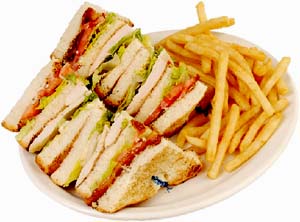
However, even though many children (and adults) actually love junk food, the consequences of steady junk food consumption go beyond the obvious consequence of weigh gain.
Several studies show that junk food also negatively affects moods, concentration and yes, even IQ in children.
When it comes to nutrition, one of the keys of finding out what is good for your child is paying attention to how your child reacts from the intake of various foods.
Healthy parenting is therefore also about trying to notice what kinds of foods make your child relaxed or energized and what make your child sleepy, cranky or hyper active.
Not all children react the same way to the same kinds of stimulants. Some children are very sensitive and other children hardly react to unhealthy food.
But even though you may have a child that doesn't react much, it doesn't necessarily mean that the food is good for him or her.
As regards sugar and fat, nutritional research recommends the following guidelines:
1) Going for Natural Sugar rather Than Refined Sugar
Sugar isn't just sugar!There are different types of sugar that will stimulate your child in different ways. Your child's brain needs sugar but consumed in a regular and even fashion.
Refined sugar, you know, the kind that you find in candy, cakes and cookies is the kind of sugar that you may notice have a negative effect on your child's thinking and behavior.
This kind of sugar quickly enters your child's bloodstream, releases a lot of insulin, and is quickly used - all this happens within a very short period of time.
When the sugar is all used, your child may reach a sugar low and your child's body will crave more sugar to regain stability.
However, sugar highs and sugar blues are taxing for your child's body. And your child may react to this bodily stress with irritability, short attention span or perhaps fatigue.
Now, the kinds of sugar you want for your child are called complex carbohydrates.
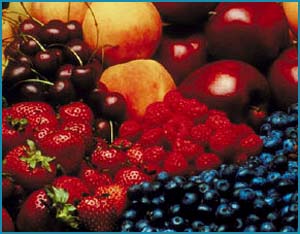
Complex carbohydrates can be found in fruit (particularly apples, oranges and cherries, among other things), milk and plain yoghurt, various grains like bran, oatmeal and rice and then of course vegetables particularly various forms of beans and lentils.
These kinds of foods have been documented to steady the blood sugar level thus reducing potential bodily stress and optimizing emotional wellbeing and behavioral balance. (For more healthy parenting information on children and nutrition you can go here)
2) Choosing Foods with the Right Kind of Fat
Not only does the brain need sugar, it also needs fat. But it needs the right kind of fat and in the right quantities.In order to make healthy brain cells, the brain needs two kinds of fatty acids, omega 6 and omega 3.
Typically, at least here in the west, we get too much of omega 6 and too little of omega 3.
You may find omega 3 in flaxseed oil, salmon and tuna, soybeans, pumpkin seeds, and eggs, to mention a few.
So what happens when the brain doesn't get the right dosage of fatty acids?
Well, clever as your child's brain is, it will try to compensate for the lack of omega 3 by trying to build its own fatty acids.
However, these 'home made' acids are not very good. In fact they are suspected of being quite unhealthy for your child's mental health.
For instance, these replacement fatty acids are found in high quantities in people with diagnosed with ADD (attention deficit disorder) and people suffering from depression.
So yes, right (or wrong) nutrition may affect your child and his or her behavior and mental state a lot more than we tend to think!
Avoiding Toxins, Hormones and Other Polluting Chemicals

Advances in industrial efficiency to obtain higher financial gain seem to be some of the greatest threats to environmental and human healthiness.
Various chemicals, toxins and pollutants are created to make industrial processes more efficient and concrete products more sustainable - all with little regard to and priority for health.
In Denmark, the little European country where I live, men severely suffer from the unfortunate long term consequences of environmental pollution.
Danish men have the highest rate of testicular cancer in the world. Along with this, males suffer from a relatively high rate of birth defects on the male genitals along with very poor sperm quality. Apparently 4 out of 10 men have poor sperm quality.
The Unavoidable Chemical Heritage
As regards the male genital birth defects and low sperm quality, the theory that most researchers are clinging to, is one that presumes that the child is getting too many hormone disruptive contaminants partially though the mother in the womb and partially through, and I'm so sorry to say, breast milk.
The unfortunate chemicals are simply stored in the mother's body and are passed on the child (even DDT which was banned in the late 1970s can still be measured in some of us as it is passed down from generation to generation).
The unfortunate thing is that the research findings cannot pinpoint why exactly the Danes are struck so hard and how to deal with this serious problem. The chemicals are everywhere e.g. in residues from pesticides in meat and vegetables or brominated flame retardants in computers and other electronic equipment.
Darn it! What to do then?
At the present time the only things the researchers advise are to continue breast feeding (the pros still outweigh the cons) and keep up a generally healthy way of life.
The following sections describe how I practiced my healthy parenting and what I did to avoid chemicals while being pregnant and breast feeding:
1) Choosing Organic Food whenever the Choice Presents Itself
Yes, organic food costs more. Sometimes a lot more! So yes, some aspects of healthy parenting do come with a price tag.But when I got pregnant I made the conscious decision that I would do whatever was in my power to shield my child from as much potential chemical environmental pollution as possible.
With the knowledge of the potential damaging effects of environmental pollution on fetuses, I could not defend not buying organic.
I knew from research that the younger the child is, the more rapid the child's development and growth occurs, and the more susceptible the child is to the effects of chemical toxins.
This knowledge made the choice of buying organic food really very simple.
Organic food is produced via farming methods that, among other things, don't contain and chemical fertilizers, growth hormones or synthetic pesticides.
2) Using as Few Chemical Hygiene Products as Possible
Now, normally I don't use much makeup but when being pregnant I was particularly conscious of minimizing my use of chemical hygiene products.Therefore shampoo, moisturiser and washing powder were preferably organic and with no perfume, phthalates or preservatives.
3) Staying Clear of Unhealthy Paint Fumes
Being an artist, I love to paint on canvas. And even though I use odourless water solvent oil paint, I chose to take a break while being pregnant.The health risk of inhaling paint fumes depends on the type of paint used.
Today most people use latex or acrylic paint which is considered more safe than oil paint.
Oil paint typically contains solvents which research has proven are detrimental for the physical and mental health of the unborn child.
4) Avoiding Second Hand Smoking
Second hand smoking is by no means safe.In fact, children who inhale second hand smoking are exposed to no less than 250 poisonous and potentially cancer inducing chemicals.
Because children are still rapidly developing, the damaging effects of second hand smoking are potentially more detrimental than they are to adults.
Not only does there seem to be a connection between (SIDS) sudden infant death syndrome and second hand smoking and lower birth weight in babies, all sorts of respiratory problems may occur in young children such as bronchitis, asthma, pneumonia, coughing.
5) What Do I Do Now (After Pregnancy and Breastfeeding)
Actually, a lot of the same stuff except now toys and children's products have been added to the equation. I know focus on trying avoid e.g. soft plastic phthalates.In general, I'm actually very uncomfortable with toys is general as many research results show that many popular toys contain far too many chemicals than should be allowed like lead, PVC, cadmium and tin.
Even milk bottles have come under the radar as many of them have been accused of containing too much BPA - a chemical that is found in polycarbonat plastic which many bottles are made of.
And research has found that this chemical is slowly released from the bottles when used, especially when the plastic is getting older and more worn. BPA is suspected of being a hormonal health risk. Just lovely, eh!
This knowledge made me shift to glass bottles.
Reducing Biological Pollutants and Contaminants
We might think that we are safe from pollution and child health problems if we just stay inside our own homes.However, studies show that very often our own indoor atmosphere might actually be more hazardous than what we find outside.
The difference between biological and chemical pollutants is that biological pollutants are or have been alive.
They often pass from object to person or person to person via the air. We can do our best to reduce their number and activity but no matter much we try to combat them, we can never get completely rid of them.
Typical biological pollutants that we can detect in our own homes are dust mite excrements, animal dander and biological contaminants like bacteria and viruses.
Personally I try to reduce biological pollutants by:
1) Washing Various Fabrics Often
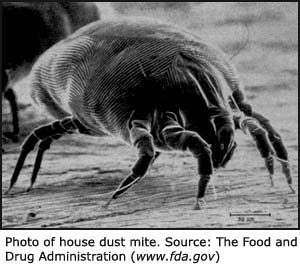
Dust mites love to throw big parties in the fabrics of mattresses, sofas, carpets, duvets, pillows, sheets etc.
The general advice is, wash as much as you can, as often as you can. Wash beddings at at least 130° F to kill the dust mites. And wash preferably once a week.
Trying to minimize the risk of allergy I have also bought washable, synthetic, anti-allergic duvets and pillows.
I have plain wooden floors as it recommended not to have wall to wall carpets. If you really want fabrics on the floor, use rugs that be washed.
2) Vacuuming
This is not a favorite pastime but I try to vacuum once a week.Vacuuming does not get rid of dust mites, but by keeping surface dust down you reduce their food.
3) Washing Hands Often
I have made it a habit to wash my hands when I enter my house from shopping etc. and my son and I wash our hands when we come back from kinder garden.It may seem hysterical, but I'm convinced that these practices significantly reduce illnesses. Last winter none of us were sick at any point, and I believe that a steady routine of washing hands when coming home heavily contributed to that.
4) Airing a Couple of Times a Day

Contrary to general advice I let my laundry dry in my flat. However, I do it in the bathroom, behind a closed door and with the bathroom window well opened.
Biological organisms thrive under wet, humid conditions. Therefore keeping moisture down is essential to keeping down the growth of these little buggers.
One of the easiest and most efficient ways of reducing moisture is airing especially when/after cooking and having showered.
Apparently airing 10 minutes a couple of times a day makes a big difference.
I hope this article on the more physiological aspects of healthy parenting was of use to you.
Healthy parenting is a lot more than what is dealt with here (e.g. nutrition and a physiologically healthy lifestyle). If you wish to investigate the more emotional, existential and psychological aspects of healthy parenting, please dive into one of the links below or feel free to explore one of the buttons in the navigation bar to your left at the top of this article.
Your Positive Parenting Ally,
Birgitte

Want to stay in touch and get the latest news?
Sign up
for my free newsletter
Parent Coaching
- For Inner Peace, Clarity and a Deeper Connection to Your Child
 Being a parent can feel like a double-edged sword. Life with kids may feel like the greatest gift you have ever received, while at the same being hugely challenging, often leaving you confused, stressed and overwhelmed.
Being a parent can feel like a double-edged sword. Life with kids may feel like the greatest gift you have ever received, while at the same being hugely challenging, often leaving you confused, stressed and overwhelmed.
When we feel like this, we've lost touch with ourselves. We can't hear our own inner voice, and it's difficult to know what is 'right' for us and how to act.
I offer in-depth parent coaching to help you regain your balance and get back in touch with yourself. From a place of inner peace and clarity, your will find your own answers which will help you reconnect with your child from a place of unconditional love and acceptance.
Read more about my parent coaching here.
Where Would You Like to Go Next?
 Good Parenting Skills For the Conscious, Open-minded Parent! |
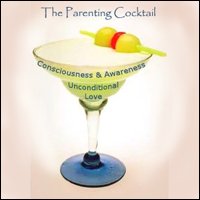 What Makes a Good Parent? A Strong Cocktail of Consciousness and Love: Knowing What You Want for Your Kids and Being Those Qualities Yourself! |
 Effective Parenting Skills Nothing Kills a Tantrum Better than Unconditional Love! |
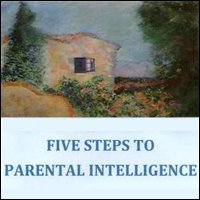 Learn to Use Parental Intelligence in 5 Simple Steps: Expert guest post by Laurie Hollman Ph.D. - solving bad behavior in children with a conscious self-reflective mindset. |
 Perfect Parenting: My Less-than-Perfect Parenting Oops'es! |
Back to the top of this page about Healthy Parenting Insights: Reduce Potential Child Health Problems via Your Lifestyle
Go to the Positive Parenting Ally Homepage







